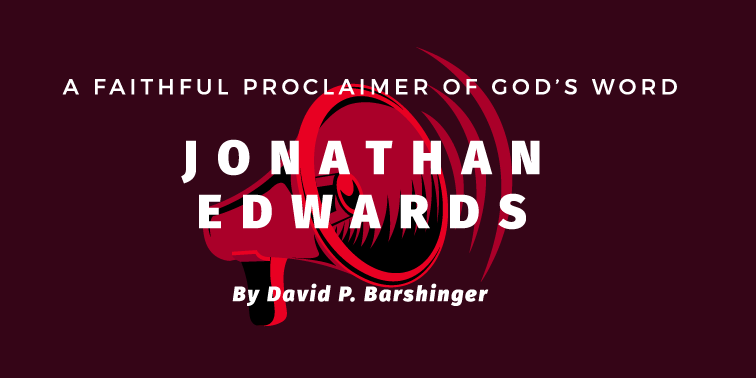
A Faithful Proclaimer of God’s Word: Jonathan Edwards (David P. Barshinger)
In the new issue of Credo Magazine, “Preach the Word: Preachers Who Changed the World,” David Barshinger has written an articled titled, “A Faithful Proclaimer of God’s Word: Jonathan Edwards.” Barshinger (Ph.D., Trinity Evangelical Divinity School) is an editor in the book division at Crossway and has taught as an adjunct professor at Trinity International University and Trinity Christian College. He is the author of Jonathan Edwards and the Psalms: A Redemptive-Historical Vision of Scripture.
Here is the start of the article:
Dangling like a spider over tongues of fire. Standing before floodgates holding back furious waters. Targeted with an arrow waiting to be drunk with your blood. These images of the sinner’s condition have both captivated and horrified listeners and readers ever since Jonathan Edwards (1703–1758) preached his sermon “Sinners in the Hands of an Angry God” in the hot summer of 1741. Those who heard him give this sermon in Enfield, Connecticut, on July 8 of that year became so terrified that they screamed out in the middle of it, “Oh, I am going to Hell,” and “What shall I do to be Sav[e]d?” Their shrieking forced Edwards to stop preaching so he and the other pastors present could minister to the congregation.
While perhaps the most dramatic response to one of his sermons that Edwards ever encountered, this event was just one in a long preaching ministry stretching from 1720 to 1758. Edwards would eventually be remembered more for his contributions to theology, yet his preaching played an important role in promoting revival in his congregation and throughout New England.
Aiming at hearts
The common depiction of Edwards is that of a stilted, rigid, wig-wearing figure reading his sermons in a monotone voice that lulled his listeners to sleep. Edwards was certainly no George Whitefield (1714–1770)—Edwards’s younger contemporary and the far better known preacher of the day—but the evidence suggests a more complicated picture than this caricature portrays.
During his first years in Northampton, Massachusetts, Edwards served as an assistant to his grandfather, Solomon Stoddard (1643–1729), a well-respected pastor who called preachers to deliver their sermons without notes. For years Edwards felt slightly embarrassed that he could not manage to preach without writing his sermons out in full. Over time, though, Edwards loosened up, inspired in large part by a local visit from none other than Whitefield. After seeing Whitefield’s effect on his congregation—and feeling it himself (Edwards was brought to tears at his preaching)—Edwards worked harder at preaching extemporaneously, to the point that by the end of his career, he was often speaking from bare outlines.
Ultimately, Edwards preached to the hearts of his listeners, and he understood that how he delivered his sermon played a role in reaching them. As he explained in Religious Affections, Edwards believed that one of the main reasons God ordained the preaching of his Word was “the impressing divine things on the hearts and affections of men.” And he defended “an appearance of affection and earnestness in the manner of delivery” so long as it was “agreeable to the nature of the subject” and affected the listeners “with nothing but truth.” Edwards thus devoted himself to the earnest preaching of truth that penetrated the heart. …
Read the rest of this article today!
Download as a PDF
Paul instructed Timothy to “preach the word; be ready in season and out of season; reprove, rebuke, and exhort, with complete patience and teaching. (2 Tim. 4:2). The command is a simple one. Yet, churches today and their pastors fail to take it seriously. Some churches are so used to being fed soundbites from the culture, that sitting down and listening to a sermon for thirty minutes seems not only old fashioned but ridiculously burdensome. Other churches do hear preaching but it is anything but the preaching of “the word.” Instead, the time is filled with one man’s own opinions. Entertaining or interesting as they may be, they are not God’s Word nor the exposition of it. Is it any wonder that churches are filled with malnourished Christians, believers who, whether they know it or not, are being fed milk instead of solid meat?
Needless to say, this is not what the apostle Paul envisioned. Paul taught Timothy that it is absolutely essential to the spiritual health of God’s people to hear the Word itself. By expositing the scriptures, the people hear what God himself has to say, and they walk away knowing who God is, what he has done, and how they are to live according to his will. In this issue of Credo Magazine we aim to help pastors and churchgoers alike recover a love for Bible-preaching. Several contemporary pastors explain what expositional preaching is, why it matters so much, and how churches today can recover the expository sermon in the pulpit. Other contributions take us back in time to those preachers God used in extraordinary ways. By looking to the ministries of men like Spurgeon, Augustine, Edwards, Lloyd-Jones, and others, we desire to see their preaching influence our own. Imitation is not the goal; we rather crave their commitment to expounding the scriptures and pray God’s people would as well.
Contributors include Christian T. George, David P. Barshinger, Jason Helopoulos, Christopher Catherwood, Adrian Reynolds, Adrian Reynolds, Michael A.G. Haykin, Jonathan Worsley, Murray Capill, Deven MacDonald, and others.
Matthew Barrett, Executive Editor






